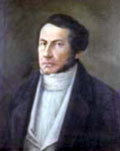José da Costa Carvalho graduated from the University of Coimbra with degree in law (1819) and was appointed judge in São Paulo (1821-1822). He was elected deputy for Bahia to the Constitutional Assembly in 1823 and was re-elected by the same province to the first and second imperial legislature (1826-1829, 1830-1833) and served as president of the Chamber of Deputies (1828, 1830, 1830-1831). After the abdication of Emperor Pedro I, Carvalho served as regent in the Permanent Regency (1831-1835). During the regency of Diogo Antônio Feijó (1835-1837), Carvalho worked as director of the Academy of Law in São Paulo (1835-1836). In 1830s Carvalho held a number of judicial offices in São Paulo. He returned to active political life in 1839, when he was elected deputy for São Paulo to the fourth imperial legislature. In the same year he was named senator-for-life. Carvalho was elevated to the baronage in 1841 and briefly served as President of the Province of São Paulo (20 Jan 1842 - 17 Aug 1842). In 1848 he assumed the office of minister of the Empire in the Cabinet of Viscount of Olinda (1848) and succeeded him as President of the Council of Ministers (1849-1850) supervising the adoption of important laws including the Commercial Code, Land Law and a law on prohibition to import slaves from Africa. [1] [3] |

